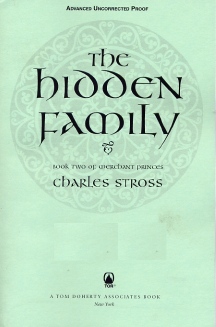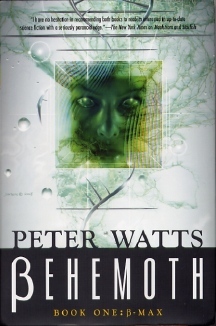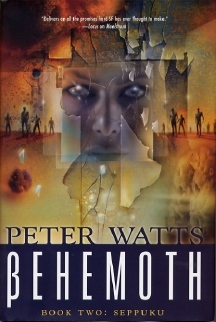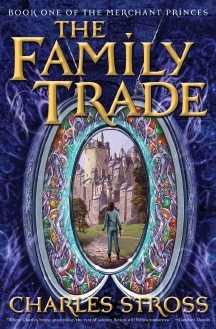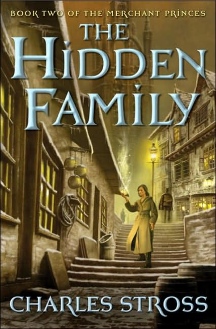Booksplitting Mad
But Buy 'The Family Trade' and 'The Hidden Family' Anyway
The Agony Column for February 23, 2005
Commentary by Rick Kleffel
But Buy 'The Family Trade' and 'The Hidden Family' Anyway
The Agony Column for February 23, 2005
Commentary by Rick Kleffel
We've been down this road before with Tor, haven’t we? The first I learned of the new practice of splitting novels to satisfy chain store strictures was when I read Peter Watts' introduction to 'Behemoth: B-Max', which turns out to have been the first half of the final novel in his 'Starfish' trilogy. He says in the introduction to this novel -- and later confirmed in an interview for this site -- that it is merely half the novel he wanted to call 'Behemoth'. However, the chain stores supposedly don’t like big novels by non-big-name writers, though I would argue with two well-regarded hardcover novels, Watts was certainly well-known. Still, his publisher, Tor, told him that he had to either cut the novel down to an acceptable word count -- somewhere around 75,000 to 100,000 words -- or split the novel. So, he split the novel at a natural spot, and now readers can line up both hardcovers as I have on my rolling shelves. They make a nice picture together, don't they? But we end up paying $50.00 for a single novel. That's no bargain, it's unnecessary, and it hurts sales in the short and the long run. The chain booksellers who demand these types of cuts -- Borders and Barnes & Noble are likely the two major culprits -- prove themselves to be the enemy of both readers and writers. That's a recipe for the destruction of the bookselling and publishing industry. What happens when you act against both the artists who produce the work and the end consumers who buy the work? Booksellers who are gung-ho on shoving electronic books down the throats of disengaged readers need look no further than the music industry to see their own future should they continue on this course.
But if the publishing and the chain bookselling industries continue down the path of offering less variety and lower quality, of cutting books in half to both pump up receipts and cut down on inventory perceived as risky, then they’re putting themselves in the same place the music industry put itself so many years ago when it insisted --and it still does -- on selling CDs for outrageously high prices. Now that iPods are ubiquitous and the quality is as high as that of CD's, end-consumers are all-too willing to punt the process of buying a CD and get the music either online or from friends. Think of the halcyon days when you’d go to a chain record store to buy a CD. Most of those chains have gone down the toilet, clearing the way for Borders, B. Dalton and Barnes & Noble. Oh, it won’t happen soon, but as electronic paper becomes a reality, should bookseller and publishers continue their path, their days are most assuredly numbered. But it doesn't need to happen. For one thing, the physicality of books is itself extremely desirable. Anyone who doubts this need only look at the burgeoning market for vintage and new vinyl records. The few independent and chain stores that used to have no space for these items now have plenty of space for them. Who would have thought that technology so unreliable would be so desirable? Not the chain music stores, nor the major music manufacturers. But you need only go to your local independent record store to find an ever-expanding choice of vinyl records, both new and used. Is the major publishing/chain bookselling apocalypse a given? Should we give up, pick up our e-readers and start downloading books (which are much more manageable to download than music) from the e-sellers on the web? Should we get out the nuclear-bookselling briefcase, press the button and bring about the end of the world of reading as we know it?
But how do you fight the one-two punch of Tor and Borders/B. Dalton/Barnes & Noble? And how to spite the face of this combination without cutting the nose of the writers you want to support? That's the dilemma we as readers face, and that's the dilemma that is clearly personified in 'The Family Trade'/'The Hidden Family' and 'Behemoth: B-Max'/'Behemoth: Seppuku'. We're well on our way to nose-shearing should readers and consumers not make their voice heard. I have to admit that I'm rather unsure. I certainly don't want to tell anyone not to buy a book. You stop buying books, they'll stop making them. They're anxious to do so anyway, at least that's sometimes how it seems to me. But you can certainly write them. Not books -- the publishers. Science fiction readers and my readers are particularly lucky. If you're reading this, it’s real easy to express yourself. Email Tor, Borders, Barnes and Noble. Click on the name to bring up an email (or website form, grukmble grumble) right now. Be careful what you say. Be sure to tell them that you buy hardcover books. Tell them that you want to buy entire hardcover books. Tell them that the practice of excluding books that are supposedly too long loses them business. Tell them you bought the books thus far, but that they'd best get their act together. Then continue to buy the books...from independent bookstores, those that don’t have these onerous policies.
And booksellers and publishers? When online book sharing is a reality, when e-paper makes your bestsellers so easy to pirate that you'll long for the days of costly hardcovers, you'll beg Jeremy and Jason and Marty and Peter for crumbs of work, well, I'll run this column again, OK? Will that make you feel better? I hope so. But don’t expect me to give you J&J's private jet phone numbers so you can more effectively beg for work. Nor will I share the author email addresses I might or might not have. Having fairly carefully described that apocalypse, I can now (I hope) presume that it won’t come to pass. Readers will heed the call, the producers and vendors will respond to the desires of the reading public, mainstream publishing will flourish, chains will hand out the bestsellers -- in a single volume -- to their customers and independent bookstores will flourish by virtue of knowing their customers and being able to sell the books because they know the books. A healthy economic ecology will flourish. Very good then, apocalypse averted. Back to Charles Stross and his wonderful, wonderful fantasy series that everybody and their brother and sister would enjoy the hell out of. Roger Zelazny was once asked to cut the length of a story in half, and he told the would-be publisher that having done so by deleting every other word, the result was less than satisfactory. So, though Tor (the rant's over Rick, clean the froth off the screen) has split the first book in this series, at least they didn't make the author cut out every other word. So now that 'The Hidden Family' is on its way to your shelves, get ready for more fun with Miriam, Paulette and the very thugly corporate clans that straddle two worlds and strangle three. Stross may write long books, but there's not an ounce of fat here. (Some of the writers who currently produce very long books might actually benefit from the Zelazny treatment.) Stross puts the pedal to the metal and brings things to a satisfying conclusion, he swears, he promises, but he does have in his un-tiny mind like three book-brick sequels he could write in well, not a heartbeat, but with all due speed.
Write Tor, tell them what you did. Write the Big Bad Boys, tell them you bought these books at an independent bookseller because the independent didn't suck. Tell them that by demanding smaller books from lesser-known authors they are cutting off their noses to spite their faces. While they might enjoy the noseless look, tell them you'll buy that best-selling Stross from them only when they let it be a single very-large volume. Tell them you want the hugest, most honkin' book brick version of the Stross Sequel, 'The Clan Corporate' that Stross can deliver. We all know he can deliver, we know that Tor can make a honkin' book, and we know that we'll buy it. We can avert this particular apocalypse. Tell Barnes & Noble, tell Borders that they should take a really good look at Napster and the iTunes store and ask them if they want to go up against Bookster and iStories. Those enterprises are already online -- fictionwise.com would be happy to help you. Ask them how happy they are about Amazon.com. Tell them, that if producers and distributors don’t serve artists and customers that you, the customer will be quite happy to roll the donut. |
